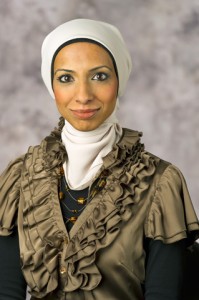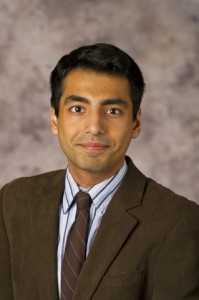Two young attorneys have joined The John Marshall Law School as fellows in the George N. Leighton Fellowship Program for the Study of Prisoners’ Rights.
Shaz Kaiseruddin, of Morton Grove, Ill., and Ali Abid (JD ’11) of Chicago, Ill., began their fellowships in August. Their positions—Kaiseruddin’s for a two-year term and Abid’s for one year—are the first to be awarded by the law school.
The Leighton Fellowship honors retired United States District Court Judge George N. Leighton his lifelong devotion to protecting civil rights. He was an adjunct professor from 1964 to 2004 teaching criminal law and procedure and prisoners’ rights. The law school awarded him an honorary degree in 2010.
“Judge Leighton reminds us every day that we are a nation that cherishes civil liberties and the rule of law,” said Associate Dean for Academic Affairs Ralph Ruebner. “We dedicate this fellowship in his honor.”
Kaiseruddin received a JD from the University of Illinois College of Law, and a bachelor’s degree in sociology from the University of Illinois at Urbana-Champaign. She has worked for Amnesty International on a range of human rights issues including prisoners’ rights, and as an attorney at Mayer Brown, where, among other things, she performed pro bono work in the areas of asylum, microfinance and non-profit establishment.
“My whole family has been active in public interest work and I’ve always wanted to commit my career and life to helping empower those who are hindered from helping themselves,” Kaiseruddin said. “Prisoners are among the most restricted, abused and ignored, and for that reason, the issue of prisoners’ rights is very dear to me.”
Kaiseruddin plans to devote much of her fellowship to researching and shining a spotlight on issues that do not always get a lot of media attention, and to build on the current movement to popularize the issue of prisoners’ rights.
“I have a great hope that prisoners will be viewed differently by the general population and that we’ll rid ourselves of our general apathy and disdain, realizing that there’s a whole range of people serving time behind bars,” she said. “The denial of prisoners’ rights should be just as shocking to the conscience as would be the denial of rights to those of us who enjoy our freedom.”
Abid, who is a May 2011 graduate of John Marshall, received a bachelor’s degree in political science from the University of Illinois at Champaign-Urbana. While at John Marshall, he served an externship with U.S. District Court Judge Robert W. Gettleman and delivered a paper—“Combatting Religious Defamation: An Exploration of Blasphemy in Islamic Thought and International Practice”– in Lucerne, Switzerland, at the Conference on Transnational Legal Processes and Human Rights.
Abid said he is enthused about the opportunity as he has always wanted to pursue a career in academia and also because the issue grabs his attention since the U.S. prison population has exploded over the past 40 years. Today the U.S. has the largest number of prisoners in the world at the same time that crime rates have remained steady.
“In order to address the problems raised by both our large prison population and the use of private prisons, my research will explore the legal viability of using restorative justice mechanisms to replace incarceration as punishments for various types of crimes,” he said. “I will focus on how international human rights and prisoners’ rights jurisprudence in the area can be used within the U.S. Constitutional framework of civil rights litigation and habeas corpus relief.”
Abid said his goal is to contribute new scholarship to the field: “I’d like to end the year having carried to completion a significant research project that will be ready for publication.”
Leighton, 99, has been recognized for his efforts to represent persons from all walks of life in civil and criminal cases. He counts as one of his greatest achievements the 13 death row inmates he saved from the electric chair.
Despite not having a high school diploma, Leighton, the child of immigrants from the African Cape Verde Islands, graduated with honors from Howard University and from Harvard Law School. He moved to Chicago in 1946 and became a successful defense attorney and devoted his career to equal justice under the law.
Leighton was active in the Chicago branch of the NAACP, serving as the Chicago president and general counsel, and was a founding member of Moore, Ming & Leighton, one of the largest predominantly black law firms in the country at that time.
He was elected to the Circuit Court of Cook County in 1964 and was appointed by the Supreme Court to the Illinois Appellate Court in 1969. In 1974, Leighton was appointed by President Gerald Ford to the United States District Court for the Northern District of Illinois where he presided over cases until his retirement in 1987.


